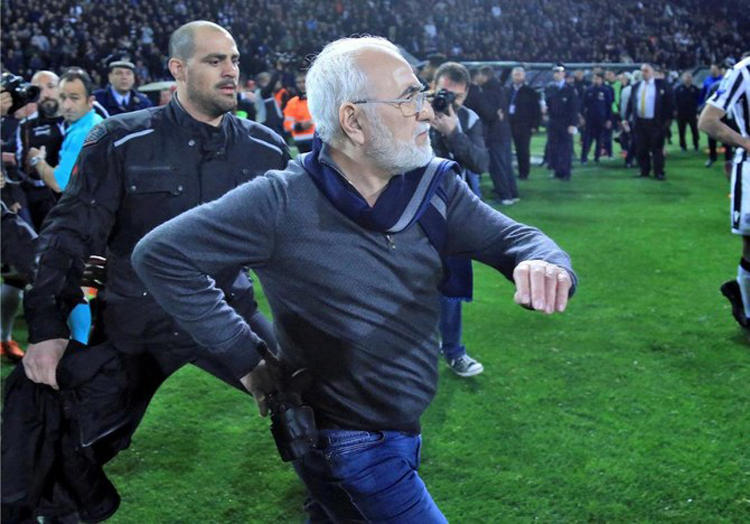ATHENS: Greek-Russian billionaire Ivan Savvidis, a key investor in Greece who is thought to be close to Russian President Vladimir Putin, finds himself in an uncomfortable position as one Russian oligarch after another is targeted by sanctions in Europe.
Savvidis, a former member of the Russian parliament, has a fortune estimated by Forbes at $1.6 billion in 2022, making him one of the richest men in Greece.
A prominent figure in Greece since the 2010s, he is considered a hero by many in the north of the country after injecting millions in the depths of the debt crisis.
This month he offered to put one of the hotels he owns at the disposal of refugees fleeing Russia’s invasion of Ukraine, including members of the ethnic Greek community in Ukraine, who like his ancestors settled on the shores of the Black Sea.
But the reclusive 62-year-old found himself the target of unwelcome attention when the Russian embassy bluntly encouraged Greeks to watch his station, Open TV, to get an alternative view to what it called “misleading propaganda” about the war in Ukraine.
Denounced by Greek authorities, the embassy’s intervention has nevertheless raised speculation about the prolific Russia-born investor’s role and intentions in Greece.
Elected to the Duma, the Russian parliament, in 2003 and 2007 for Putin’s party “United Russia,” Savvidis has never hidden his closeness to the Russian head of state.
His official website displays a photo of the two men smiling with the caption: “I am proud to be a Russian citizen and I will always protect the interests of my country.”
“Since the beginning of the invasion, Open TV has given a prominent place to the war thanks to a large network of correspondents both in Ukraine and Russia,” says Nikos Smyrnaios, lecturer in information science and communication at the University of Toulouse in France.
“In my opinion, there is neither manipulation nor shameless propaganda. But in an audiovisual landscape (in Greece) dominated by pro-government channels, there is clearly a difference in the media treatment of the situation,” said the academic, saying Open TV’s coverage was less overwhelmingly pro-Ukrainian “and less warlike.”
The conservative New Democracy government has focused its attention on the businessman, who launched his channel under the previous left-wing Syriza government.
Though Savvidis does not appear on the lists of sanctioned oligarchs, “his case is obviously being followed closely,” a Greek economy ministry source told AFP.
A Greek reporter who has studied his case but asked to remain anonymous said: “I believe Savvidis will not be one of the next targets for EU sanctions. But if there is an in-depth investigation into his activities outside Greece, he could be one of the future ones.”
Savvidis appeared in Greece in the early 2010s, and was welcomed in Thessaloniki with open arms.
In 2012, he bought the most popular soccer club in northern Greece, PAOK FC, paid off its debts and put it back on the national stage, reviving the pride of the north whose identity had long been forged in opposition to Athens.
His investments in the region in the tobacco industry, the port of Thessaloniki, mineral water and tourism infrastructure gradually gave him a wide economic base.
“Through the scope of his investments, Savvidis is a state within a state in northern Greece,” notes the reporter.
A descendant of the Pontic Greeks in the Black Sea, Savvidis has also financed the first department of Pontic studies at the Aristotle University of Thessaloniki, in addition to churches and a philanthropic foundation.
But there is a darker side too.
In 2018, Savvidis made international media headlines for charging onto PAOK’s home pitch during a match with a gun tucked in his belt to protest a refereeing decision.
That same year, the Organized Crime and Corruption Reporting Project (OCCRP) said the billionaire had financed protests against the Prespa agreement, signed between Greece and North Macedonia to end a quarter-century dispute over the latter’s name.
Moscow has frowned on the deal, which has opened a path for North Macedonia to get European Union and NATO membership.
“Perhaps his power and influence in Greece is overestimated,” said Nikos Varsakelis, professor of economics at Aristotle University in Thessaloniki.
“If there are financial sanctions against him, the impact will be more on his image than on the real economy.”
Savvidis’ representatives told AFP he declined to comment.
But an associate and friend has dismissed speculation about Savvidis as ridiculous.
“They make him look like a spy, a Trojan horse of Russia in Greece. It’s ridiculous,” said the source, who requested anonymity.
Ukraine war shines spotlight on Greek-Russian billionaire Savvidis




